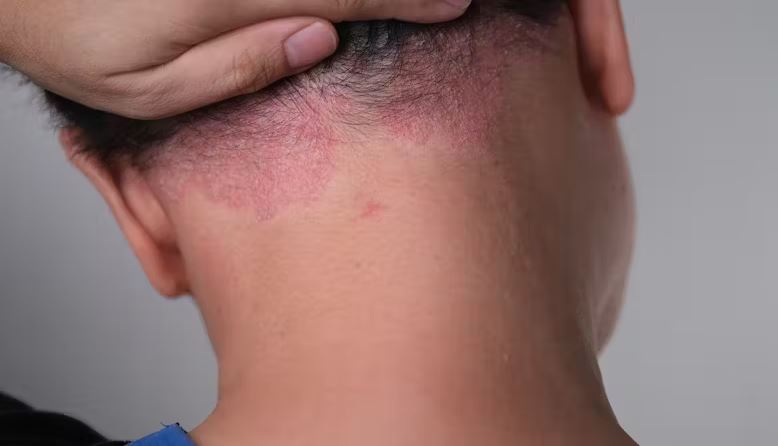At Tvaksh Advanced Skin & Hair Clinic, we understand how deeply psoriasis can impact your skin and your confidence. Our experts offer personalized treatment to help manage symptoms and improve skin health. Book Now for expert consultation and long-lasting solutions.
What is Psoriasis?
Psoriasis is a chronic skin condition that causes the skin cells to build up too quickly. This leads to thick, scaly patches on the skin, often accompanied by itching, redness, and inflammation. It is an autoimmune disorder, which means your immune system mistakenly attacks healthy skin cells. Psoriasis is not contagious, but it can be hereditary and triggered by certain environmental factors.
Common Types of Psoriasis
There are several types of psoriasis, each affecting the skin in different ways. Understanding each type is key to choosing the best treatment.
- Plaque Psoriasis (Psoriasis Vulgaris)
This is the most common type, affecting nearly 80-90% of people with psoriasis.
- Appearance: Raised, red patches covered with a silvery-white scale.
- Common Areas: Elbows, knees, lower back, and scalp.
- Symptoms: Itching, burning, and sometimes cracking of the skin.
Impact: It can cause skin to feel tight and uncomfortable. In severe cases, the plaques can bleed and become infected if scratched too much.
- Guttate Psoriasis
This type usually appears suddenly and is more common in children and young adults.
- Appearance: Small, drop-shaped red spots on the skin.
- Common Areas: Torso, arms, and legs.
- Triggers: Often follows streptococcal throat infections or other illnesses.
Impact: Though it’s less chronic than plaque psoriasis, it can be widespread and emotionally distressing due to its sudden onset.
- Inverse Psoriasis
This type appears in skin folds, making it harder to detect early.
- Appearance: Smooth, shiny red lesions without scaling.
- Common Areas: Armpits, under breasts, groin, and around genitals.
- Triggers: Friction and sweating often worsen this type.
Impact: Inverse psoriasis can be painful and irritating, especially in moist areas where skin rubs against skin.
- Pustular Psoriasis
A rare but severe form of psoriasis.
- Appearance: White pustules (blisters filled with pus) surrounded by red skin.
- Types: Localized (palms and soles) or generalized (throughout the body).
- Symptoms: Fever, chills, and fatigue in generalized type.
Impact: Requires immediate medical attention. It’s painful, can lead to serious health issues, and may need hospitalization.
- Erythrodermic Psoriasis
This is the rarest and most dangerous form.
- Appearance: Widespread redness and shedding of skin in sheets.
- Symptoms: Intense itching, burning, swelling, and fluctuating body temperature.
Impact: It can be life-threatening due to loss of skin barrier and requires urgent medical care.
- Nail Psoriasis
Psoriasis doesn’t only affect skin—it can target your fingernails and toenails too.
- Appearance: Pitting, discoloration, thickening, and lifting of the nail.
- Common in: People who also have psoriatic arthritis.
Impact: Makes nails brittle and painful, and can interfere with daily tasks.
- Scalp Psoriasis
Occurs on the scalp and hairline, often mistaken for dandruff.
- Appearance: Red patches with thick scales, sometimes extending beyond the hairline.
- Symptoms: Itching, flaking, and bleeding when scratched.
Impact: Can be embarrassing and difficult to manage due to constant flaking.
How Psoriasis Affects the Skin
The main effect of psoriasis on the skin is the overproduction of skin cells. Instead of shedding dead skin every 28–30 days, the skin in psoriasis patients replaces itself every 3–4 days. This leads to a buildup of thick, inflamed patches, resulting in:
- Dry, cracked skin that may bleed
- Discoloration and thickening
- Persistent itching and pain
- Increased sensitivity in affected areas
In chronic cases, the skin can become scarred or damaged, and the condition may spread if untreated.
What Triggers Psoriasis?
Though psoriasis is genetic, certain factors can trigger flare-ups:
- Stress and anxiety
- Infections like strep throat
- Skin injuries or sunburn
- Cold weather
- Certain medications (e.g., beta-blockers, lithium)
- Smoking and alcohol
Managing and Treating Psoriasis
While there’s no cure for psoriasis, it can be effectively managed with proper care. At Tvaksh Advanced Skin & Hair Clinic, we offer advanced treatments tailored to the type and severity of your psoriasis. Options include:
- Topical Treatments: Creams, lotions, and shampoos to reduce inflammation and scaling.
- Phototherapy: Controlled exposure to UV light helps slow down skin cell growth.
- Oral Medications: For moderate to severe cases, these help regulate immune response.
- Biologic Injections: Target specific parts of the immune system to reduce flare-ups.
We also provide personalized skin care routines and lifestyle guidance to help you maintain long-term results.
Living with Psoriasis
Dealing with psoriasis can be physically and emotionally challenging. It’s important to:
- Follow treatment plans consistently
- Keep skin moisturized
- Manage stress
- Stay hydrated
- Avoid harsh skincare products
- Use medicated shampoos if scalp is affected
Joining support groups and staying connected with a dermatologist can make a big difference in your journey.
Conclusion
Psoriasis can affect your skin in multiple ways, depending on the type and severity. Each form has distinct symptoms and requires specialized care. At Tvaksh Advanced Skin & Hair Clinic, our expert dermatologists provide targeted treatments to help you regain healthy, comfortable skin. Book Now to begin your journey toward better skin and confidence.

